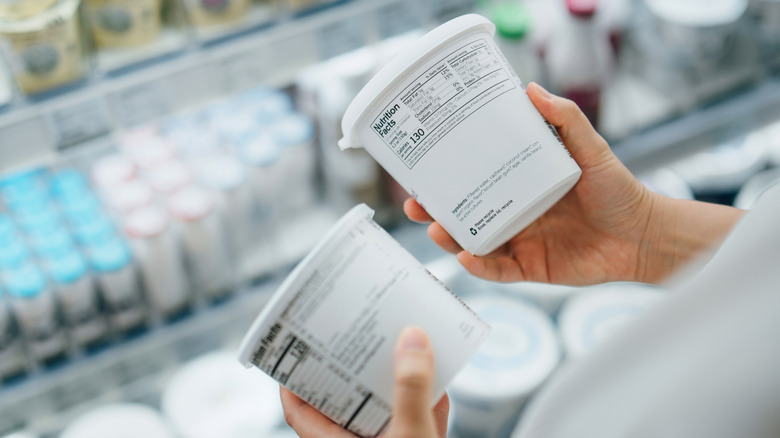What You Need To Know Before Eating Plant-Based Yogurt
Dairy stopped liking me ten years ago, and since then, I've tried almost every plant-based yogurt in the grocery store. I'm always on the lookout for a good replacement that checks all the boxes dairy yogurt does: creamy texture, tangy flavor, and solid nutrition — protein, calcium, vitamins A and D, potassium, and probiotics. While plant-based yogurt has come a long way, there are still a few insider secrets worth knowing before diving in.
Most dairy-free yogurts contain common allergens, like tree nuts (cashews, almonds), soy, or coconut, so if you're sensitive to any of these, always check the ingredient list on plant-based yogurts first. Oat milk yogurts are a safer bet allergen-wise, but oats can also become contaminated with gluten if processed in a facility with products containing wheat, barley, or rye.
Also, folks that have celiac disease or are gluten-free or gluten-sensitive should avoid eating yogurts made from oat milk unless the packaging or brand website says they're made with certified gluten-free oats. Many plant-based yogurts also contain thickeners like gums and starches to mimic the creaminess of dairy yogurts, which can be irritating if you're sensitive to these additives — again, check those ingredient labels.
In terms of texture and flavor, plant-based yogurts have largely nailed it. But when it comes to nutrition, they still lag behind their dairy counterparts.
What plant-based yogurt is (and isn't) giving you
From anecdotal experience, mainstream grocery stores may have limited plant-based yogurt options amidst the wide selection at health food stores. And while the limited picks are delicious, they're often loaded with added sugar — just like many of the unhealthiest yogurts on grocery store shelves. Experts recommend avoiding yogurts with more than 12 grams of sugar per 6-ounce serving. Some brands (looking at you, So Delicious strawberry banana coconut yogurt) can pack nearly an entire day's worth of added sugar with almost no protein to help stabilize blood sugar levels.
Ideally, a serving of plant-based yogurt would offer around 12 grams of protein per 8 ounces — the same benchmark set by dairy yogurt. But most fall short — even higher-protein sources like soy. I aim for Greek or Skyr-style plant-based yogurts, which tend to be higher in protein and lower in sugar. If these are unavailable, I go for a low-sugar option and mix in a bit of unflavored or vanilla plant-based protein powder.
Plant-based yogurts are a great source of naturally occurring fiber and iron — nutrients not typically found in dairy yogurt. However, plant-based yogurts often lack the vitamins and minerals found in dairy yogurt, like vitamins A and D, calcium, and potassium, unless they're fortified. And while they contain live and active cultures, they aren't necessarily probiotic strains (unless listed) and the live cultures have likely died during pasteurization.
If you're making the switch to plant-based yogurt, just know it's not always a straight nutritional swap. Make sure to fill in any dietary gaps with other nutrient-dense foods or supplements, and read labels carefully to make the best choice for your needs.

